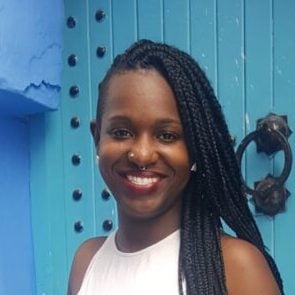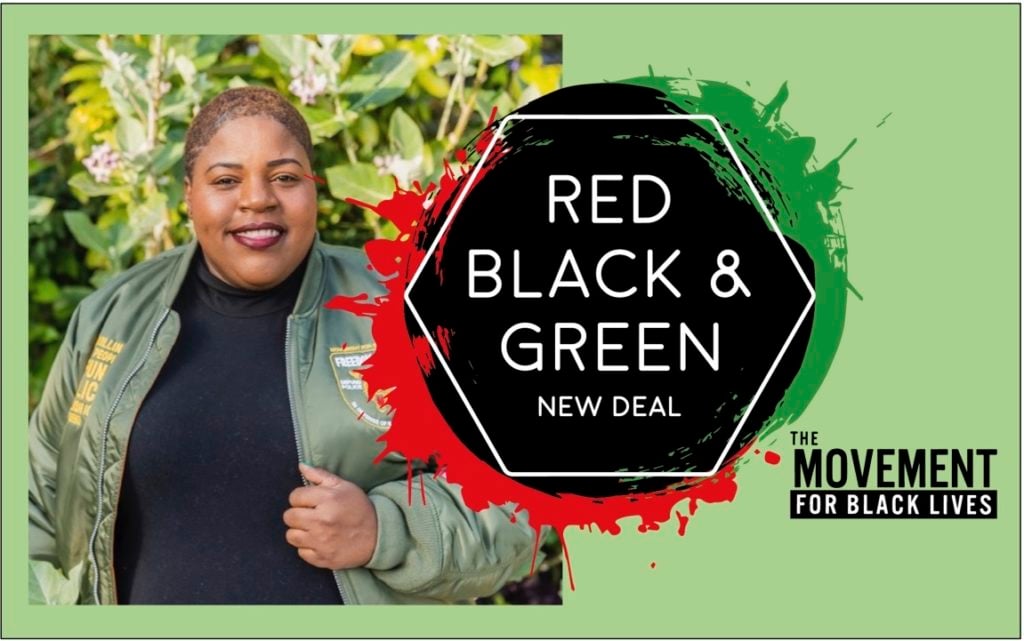The Movement for Black Lives is launching its Red, Black and Green New Deal (RBGND) initiative with a virtual National Black Climate Summit Tuesday, May 11. Drawing on a movement legacy that stretches from the civil rights movement through environmental justice organizing and the more recent climate justice work, the RBGND will be a many-sided, Black-centered initiative. It is “designed to educate, catalyze, and empower Black people to take actions that mitigate the impact of the climate crisis on our families and our communities.”
RBGND National Organizing Lead Valencia Gunder spoke with host Montague Simmons on the April 21 episode of Frontline Dispatches. Gunder co-founded the Smile Trust Inc., formerly known as Make the Homeless Smile Miami/Atlanta, and The Black Collective, and has organized mass grassroots disaster relief efforts for Black communities along the Gulf Coast and in the Caribbean. A returning citizen, she also led in the 2018 effort to pass Amendment 4, which restored voting rights to 1.4 million Floridians. This is an excerpt of her comments to Simmons.
I got into disasters through climate work, working here locally. I always quote my grandfather. Many years ago, when I was a child, he used to say, “They’re going to come take Miami. They’re going to take Liberty City, because it doesn’t flood.” And I’m like, “Grandaddy, nobody want Liberty City,” and I left for college and I came back and they wanted it, and they’ve been taking it ever since. And I learned about sea level rise, and elevation, and sunny day flooding. And I understand about how it was affecting our housing market, how it was pushing folks out of communities, how they use “climate gentrification” after storms to do land grabs. We see that in Black communities, under-resourced communities, all the time.
Ever since then I’ve known we need to save the earth, and if we save Black people, we save everybody. We’re going to be in a new climate reality, if we like it or not. And I wanted to learn as much as possible, to share as much as possible, to educate as many people as possible.
And not just educate, but create alternative systems, grassroots disaster relief models for us to be able to help each other, ‘cause that’s what we do anyway. We are our own first responders. If you look at under-resourced communities, that’s what you see every time there’s a disaster. Neighbors helping neighbors. Community helping community. The churches open the doors. That’s the work, that’s the organizing. No big institution can serve your community better than you. We can get it done.
We are the face of the disaster- and of the solution
There’d be no environmental justice movement without the civil rights movement. We want to give a shout out to our ancestors who’ve been doing this hard work for a long time, and our elders who still be holding this work, land sovereignty work, food justice work, fighting big oil companies, fighting against big agriculture. This has been aligned with our Black liberation work since we’ve been doing Black liberation work. It’s always been a part of our framework. … M4BL fights for Black lives. We’re not going to stand back with anything that’s harming Black people. If that’s climate injustice, if that’s environmental injustice, if that’s patriarchy, we’re standing up against it. If your clean energy includes black death, it’s no solution for us.
Climate is a threat multiplier. Communities already have stressors because of capitalism and white supremacy and patriarchy. People don’t have access to a lot of food, to safe housing, educational opportunities, jobs, water, breathable air. Then a shock hits. A shock is a hurricane, a wildfire, an uprising. An uprising is a disaster because of the government responding and creating a disaster. Usually the people who are already oppressed, marginalized, or don’t have what they need struggle even more when a shock hits them…. Yes, we are the face of disaster, but we also are the face of the solution.
A lot of times in climate spaces, in environmental justice spaces, Black folks, under-resourced populations, are left out of the conversations, or they’re tokenized, solutions are not centered, or parts of movement accept false solutions that still lead to Black deaths.
When we say “RBG” we’re talking about Pan Africanism. We want folks to know we’re centering our ancestor Marcus Garvey, uplifting our flag as a people.
No ‘green’ solutions that cost black lives
The Red, Black and Green New Deal is a national initiative that uses bottom-up organizing, political education, and direct action organizing to advance a radical Black climate agenda….and solutions that center Black people. This is not just for the United States. This is a global vision for our brothers and sisters across the diaspora…
Bottom up organizing looks like all the Black folk across the country who do climate and environmental justice work…. It also looks like working with local organizations and statewide organizations, coming together to build climate solutions locally. … We can’t do nothing without our communities. Without our people who have community gardens, our brothers and sisters in Flint and Detroit fighting to get water, in Cali fighting wildfires, to our folks in the Gulf South, to our folks up in New York. We need everybody. Our folks in the Midwest who deal with the flooding from the Mississippi River. …
When we say we’re not going to deal with false solutions, it’s hey, we’re going to fine this oil company, and they’re going to put money into schools, but they still get to burn all this stuff into our air, and we still have to breathe it in, and we’re going to lose Black lives. We’re not doing that. No matter how many jobs…We can create jobs and solutions that aren’t harmful to our people. Those fines aren’t solutions.
We want to divest from big oil companies, divest from big coal-burning companies, divest from fracking that’s messing up our water system, from pipelines. Also we want to invest that into the health of our communities, to amazing jobs that do not harm our communities and the employees. And we want to re-invest. Our reparations is “give us the space, the resources and the time to build a sustainable Black future.”
To register for the May 11 National Black Climate Summit or get more information on the Red, Black and Green New Deal, click here.

